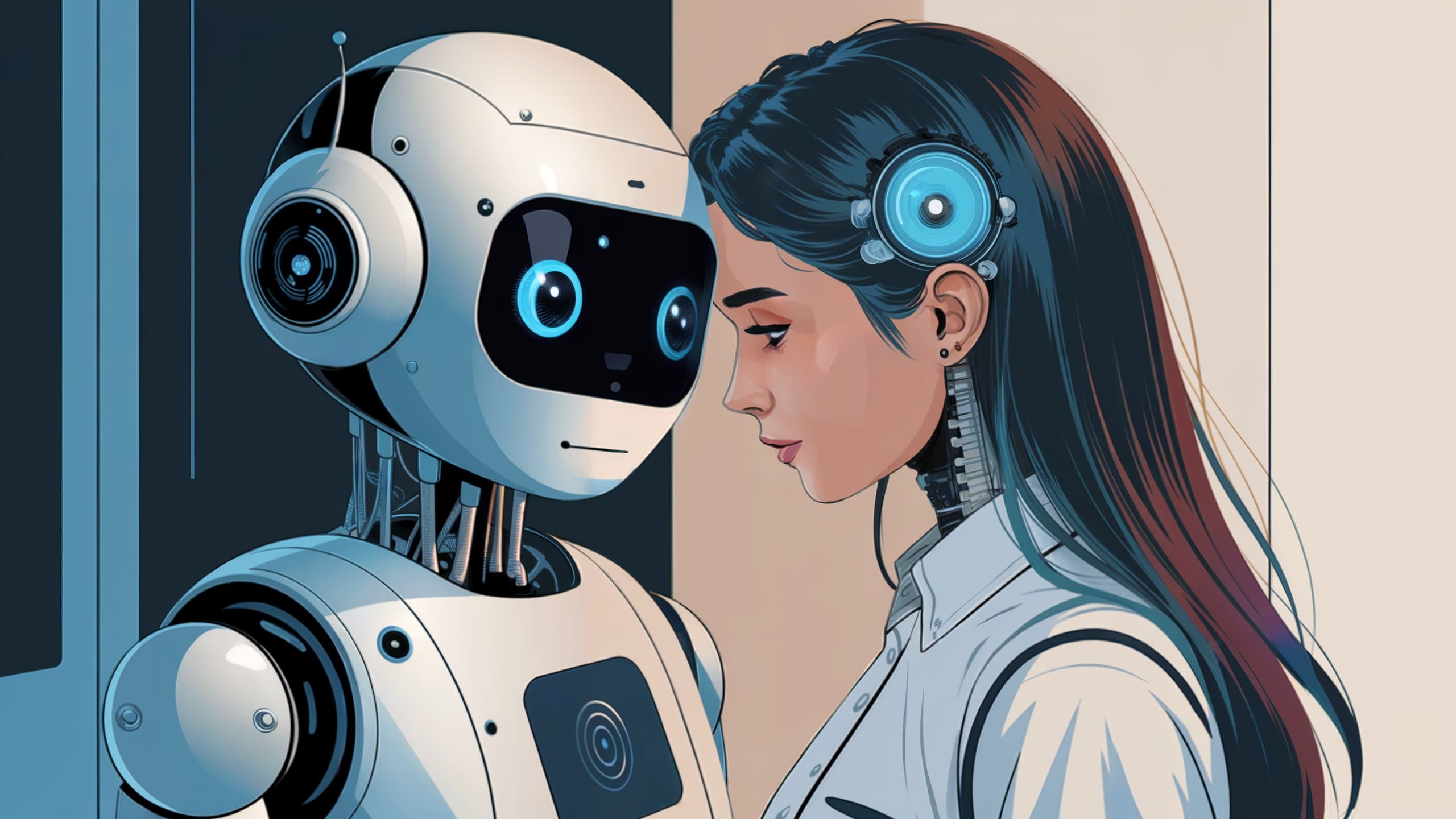What is the difference between an AI chatbot and an AI agent?
Learn the key differences between AI chatbot vs AI agent, their unique capabilities, and how they can benefit your business in different ways. Find out which one suits your needs.
Posted by


Anastasiya Dovhopola
Product Growth Manager
What is the difference between an AI chatbot and an AI agent?
"The future is already here - it's just not evenly distributed." William Gibson's quote is spot on. It describes the current state of AI communication tools. We'll explore how AI chatbots and AI agents are changing how we interact with artificial intelligence.
I've always been amazed by how fast conversational AI has grown. From simple chatbots to advanced AI agents, the change is huge. In this article, we'll look at the main differences between AI chatbots and AI agents. We'll discuss their abilities, uses, and how they affect businesses and people.

Seeing virtual assistants evolve has been thrilling. I'm eager to share what I've learned. Whether you love tech or run a business looking to use AI, this comparison will guide you through the AI communication world.
Key Takeaways
- AI chatbots are great for simple questions and follow set rules
- AI agents handle complex, multi-step tasks across different platforms
- Chatbots work well for customers, while AI agents are better for employees
- AI agents have better natural language processing and understanding
- The future might see chatbot and AI agent features combined in many areas
Understanding the Evolution of AI Communication Tools
I've seen a big change in AI communication tools over the years. From simple chatbots to smart AI agents, it's been a big leap. Let's explore how these changes have improved human-computer interaction.
The Origins of AI Chatbots
AI chatbots started in the 1960s with ELIZA, the first one. Back then, they just matched simple patterns. Now, they use advanced natural language processing to understand and answer questions. In fact, 81% of customer service reps say clients now want more personalized interactions.
The Emergence of AI Agents
In the last decade, intelligent agents have become more common. These AI agents use machine learning, and neural networks for more complex interactions. Unlike chatbots, AI agents can handle both simple and complex tasks across different service channels.
Current State of AI Communication Technology
Today, we see a lot of language models and AI-driven solutions. Here's a comparison of chatbots and AI agents:
Feature | Chatbots | AI Agents |
|---|---|---|
Operation | Predefined scripts | Large language models |
Task Handling | Simple, repetitive tasks | Simple and complex inquiries |
Decision Making | Limited | Advanced, autonomous |
Learning Ability | Minimal | Persistent memory, continuous learning |
With 83% of decision-makers planning to invest more in AI, we're in for more exciting changes. The evolution keeps going, promising more natural and efficient interactions between humans and computers in the future.
AI chatbot vs AI agent: Key Differences Explained
I've looked into how AI communication tools have evolved. Now, let's explore the main differences between AI chatbots and AI agents. We'll focus on three key areas: how they interact, make decisions, and learn.
Interaction Capabilities and Limitations
AI chatbots are good at simple, text-based talks within a set range. They're perfect for answering basic questions and helping with easy tasks. AI agents, though, can handle more complex talks across various platforms or services. They understand detailed instructions and break down big tasks into smaller parts.
Decision-Making Processes
AI chatbots and AI agents make decisions in different ways. Chatbots mainly react to user input, following set scripts or rules. They're made for specific tasks like helping customers. AI agents, by contrast, can start actions on their own and make choices based on what's around them.
Feature | AI Chatbot | AI Agent |
|---|---|---|
Decision-making | Reactive, script-based | Proactive, autonomous |
Task complexity | Simple, specific tasks | Complex, varied scenarios |
Context understanding | Limited to current interaction | Long-term memory capabilities |
Learning and Adaptation Abilities
AI agents are better at learning and adapting. They use feedback to get better at handling complex tasks over time. They use machine learning to improve their responses based on past talks. Chatbots, while useful, don't learn from interactions and need updates from humans.

The architecture and how AI chatbots and AI agents recognize intent are quite different. Both use AI and dialog systems, but AI agents use more advanced machine learning. This lets them have more complex interactions and solve problems better.
Fundamental Components of AI Chatbots
I'm excited to explore the basics of AI chatbots. These digital helpers are changing how we use technology. Let's look at the key parts that make them work.
Natural Language Processing Features
At the core of every chatbot architecture is Natural Language Processing (NLP). This tech lets chatbots understand and reply to human language. It's like teaching them human communication.
NLP breaks down our messages, understands what we mean, and crafts replies. It uses cool tricks like tokenization and sentiment analysis. These help chatbots grasp our messages and respond correctly.
Rule-Based Response Systems
Many chatbots use rule-based systems. These are like big books of "if this, then that" rules. When I say "Hello," the chatbot replies with "Hi." It's simple but works well for common questions.
Rule-based systems are great for specific tasks. They're like trained customer service reps for certain situations. But they struggle with unexpected questions.
Pre-programmed Conversational Flows
Imagine a choose-your-own-adventure book for conversations. That's what pre-programmed flows are like. Chatbot designers plan out possible conversation paths. This makes chats more natural and guides users to the right info.
These flows are key for a smooth user experience. They help chatbots tackle complex questions by breaking them down. It's like having a friendly guide through a maze of info.
Component | Function | Benefit |
|---|---|---|
NLP | Understands human language | Enables natural communication |
Rule-Based Systems | Provides predefined responses | Handles common queries efficiently |
Conversational Flows | Guides user interactions | Creates structured, helpful dialogues |
By combining these parts, chatbots can do many tasks. They can answer simple questions and guide users through complex processes. As this tech grows, chatbots are becoming more like advanced AI agents. It's an exciting time for dialog systems and intelligent agents!
Advanced Capabilities of AI Agents
I've found that AI agents are revolutionizing artificial intelligence. These advanced virtual assistants go beyond what traditional ai chatbots can do. They think, learn, and adapt, unlike simple responses.
AI agents use top-notch language models to understand and process information. They grasp context, catch subtle details, and handle complex tasks. It's like having a super-smart digital friend who keeps getting better.

- AI agents can boost revenue by up to 20% through smarter decision-making
- They can handle multiple tasks simultaneously, improving efficiency
- These virtual assistants can deliver accurate responses within seconds
- 70% of consumers prefer using AI agents for service support
What makes AI agents special is their ability to make decisions on their own. They don't just follow a script. They analyze data, weigh options, and pick the best choice. This makes them crucial in finance, healthcare, and customer service.
The future of AI is bright, and AI agents are at the forefront. They're not just tools; they're partners that can change how we work, solve problems, and interact with technology.
Real-World Applications and Use Cases
I've seen AI chatbots and AI agents change many industries. They're making a big impact in customer service, business processes, and personal help.
Customer Service Implementation
AI chatbots have changed customer support. They answer simple questions all day, every day. This cuts down response times and costs. In fact, businesses save about 30% on customer service costs.
AI agents do even more. They handle lots of data and offer personalized help. This means faster answers and happier customers, they also can do upsell and convert leads to customers. More companies, 25%, are planning to use AI agents. A great example of such an agent is - Hachly AI (engages, qualifies, converts leads for you in real-time 24/7).
Business Process Automation
AI chatbots make simple tasks easier. They're great in e-commerce, like Shopify. They understand what users say better than old systems.
AI agents are good at complex tasks. They manage emails, book appointments, and do many things on their own. This makes work up to 40% more efficient. The AI agent market is growing fast, expected to be over $100 billion by 2028.
Personal Assistance and Task Management
Virtual assistants, powered by chatbots, help with everyday tasks. They remind you of things, answer simple questions, and give quick info. About 70% of people have talked to a chatbot, showing they're getting used to it.
Intelligent agents do more complex tasks. They learn from you, get to know your preferences, and handle complex tasks. This is why 77% of businesses think AI assistants will change after-sales and customer service a lot.
Feature | AI Chatbot | AI Agent |
|---|---|---|
Response Time | Instant | Near-instant |
Task Complexity | Simple, predefined | Complex, adaptive |
Learning Ability | Limited | Continuous |
Personalization | Basic | Advanced |
Cost Savings | 30% | 40%+ |
Conclusion
As we finish our exploration of AI chatbots and AI agents, it's clear they're changing how we talk to computers. Chatbots work all day, every day, making customer service better. They cut support costs by up to 30% and raise satisfaction by 20-30%.
AI agents, though, are doing even more. They don't just answer questions; they learn and make choices. They're making e-commerce better, boosting sales by 15-20%.
The future looks bright for these technologies. The chatbot market is growing fast, expected to hit $30 billion by 2027. AI agents will make our interactions smarter and more personal.
Whether you run a business or love tech, keeping up with these changes is key. The difference between chatbots and AI agents might fade. But one thing is sure: they'll be key in our digital lives. So, keep learning, keep asking, and get ready for a future where AI tools are even more amazing.
FAQ
What's the main difference between an AI chatbot and an AI agent?
AI chatbots handle simple tasks and follow rules. AI agents can tackle complex queries and learn from interactions. They make decisions on their own and improve over time.
Can AI chatbots learn and improve over time?
Some advanced chatbots can learn through machine learning. But most chatbots don't get better over time. AI agents, with their learning abilities, can adapt and improve with each interaction.
Are AI agents better than chatbots for customer service?
It depends on the business needs. Chatbots are good for simple inquiries and tasks, saving costs. AI agents are better for complex issues that need understanding and decision-making.
How do AI chatbots and AI agents handle natural language processing?
Both use NLP, but differently. Chatbots use basic NLP for pattern matching. AI agents use advanced NLP, like deep learning, to grasp context and sentiment.
Can AI agents make decisions autonomously?
Yes, AI agents can make decisions on their own. They use machine learning to consider various factors. This is unlike most chatbots, which follow set rules.
Are AI chatbots becoming obsolete with the rise of AI agents?
No, AI chatbots are still useful. They're cost-effective and simple to use for basic tasks. The choice between them and AI agents depends on the task's complexity.
How do AI chatbots and AI agents differ in terms of implementation and maintenance?
Chatbots are easier to set up and keep running. They rely on simple rules. AI agents, being more complex, need advanced development and ongoing training to improve.
Can AI agents understand and respond to emotions?
Advanced AI agents can recognize and respond to emotions. This is beyond most chatbots, which focus on straightforward interactions.
How do AI chatbots and AI agents handle multi-step tasks?
Chatbots can manage simple tasks through set conversational flows. AI agents can handle complex tasks by understanding context and adapting to new information.
What industries benefit most from AI agents over chatbots?
Industries with complex queries and personalized needs benefit from AI agents. This includes healthcare, finance, and legal services. But, both chatbots and agents can be useful, depending on the task's complexity.
Need more leads from website?
Start free plan today and get your first chatbot up and running in the next 30 minutes!
Sign Up Now